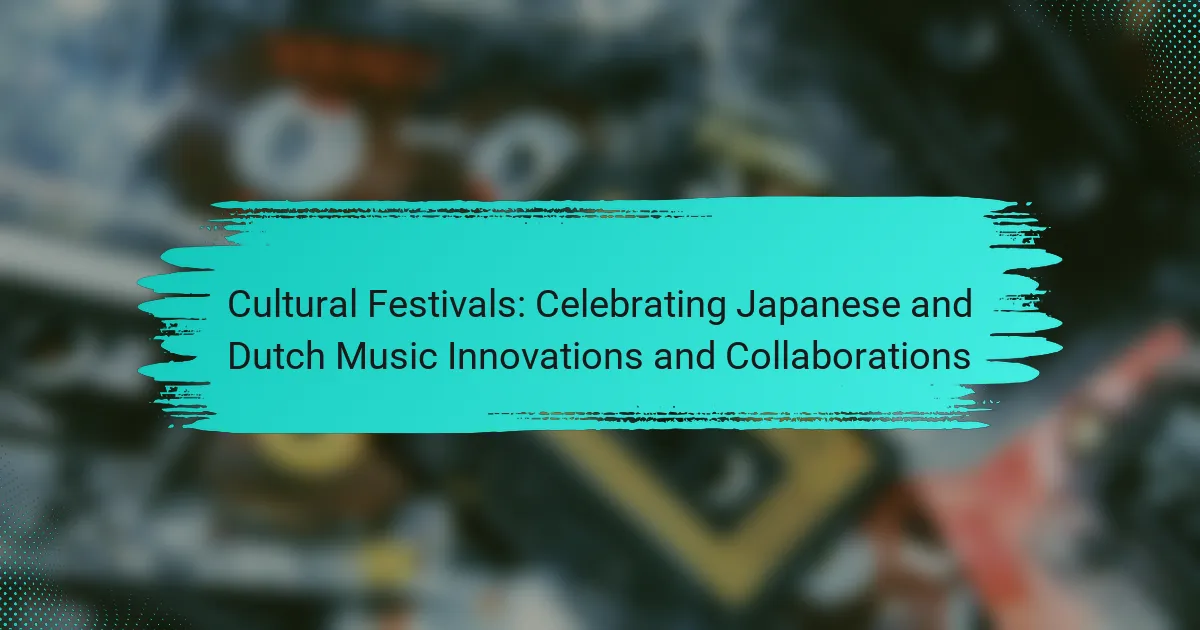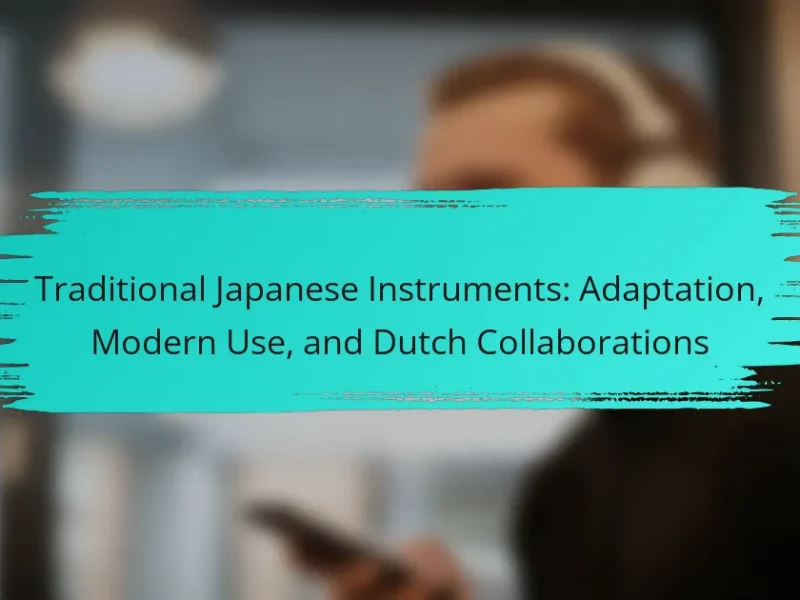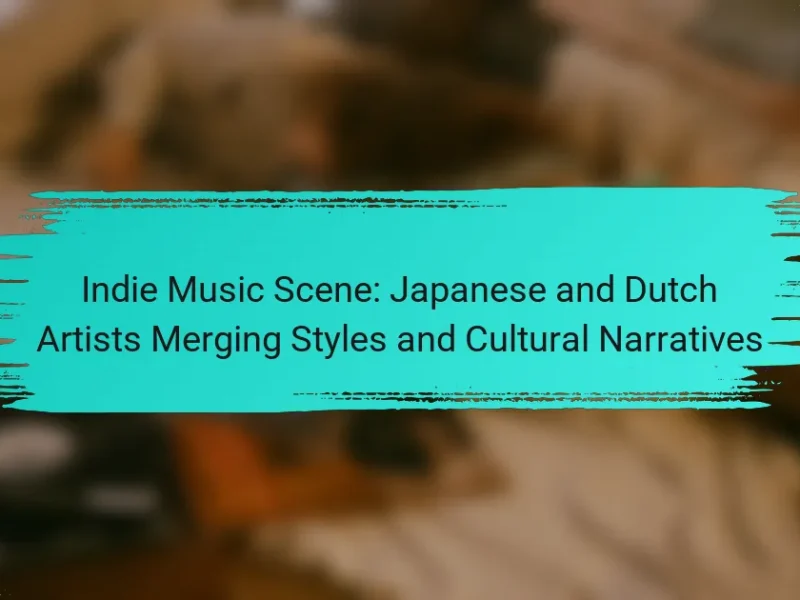Cultural festivals play a crucial role in showcasing music innovations and fostering collaboration between Japan and the Netherlands. These events highlight diverse performances, blending traditional and contemporary music. Notable examples include the Tokyo Jazz Festival and the Amsterdam Dance Event, which emphasize unique instruments and genres. Additionally, collaborations between artists from both countries enrich cultural appreciation and broaden musical horizons.
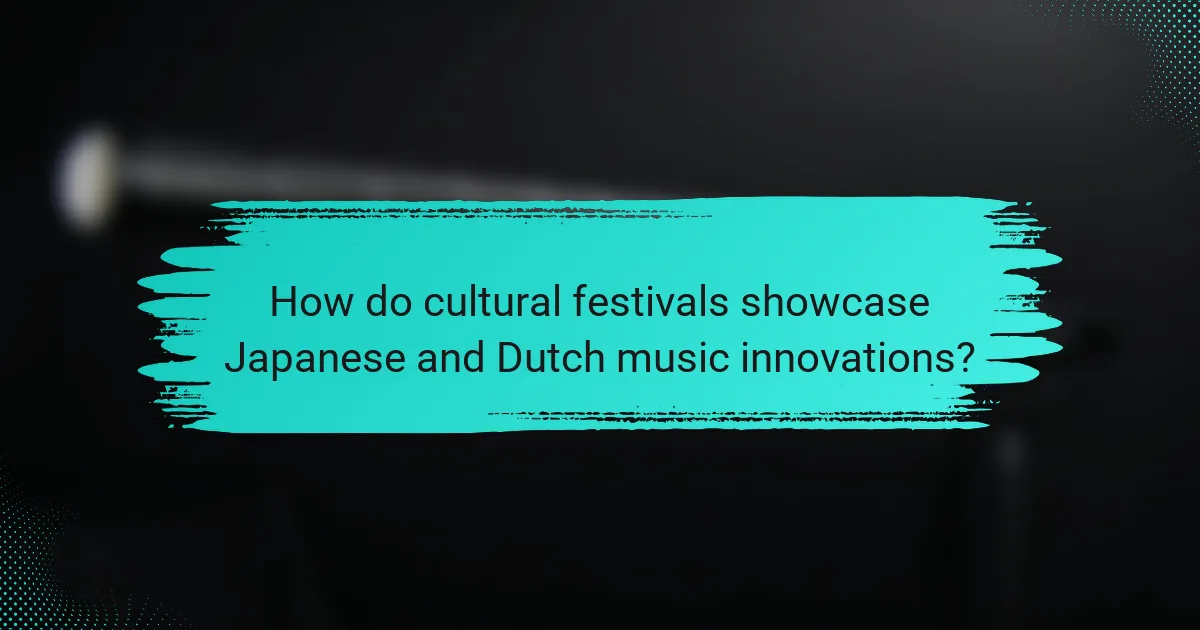
How do cultural festivals showcase Japanese and Dutch music innovations?
Cultural festivals in Japan and the Netherlands highlight music innovations through collaboration and diverse performances. These events feature traditional and contemporary music, showcasing unique instruments and genres. For example, the Tokyo Jazz Festival blends local artists with international musicians, while the Amsterdam Dance Event emphasizes electronic music’s evolution. Both countries celebrate their cultural heritage while fostering innovation, making festivals vital for music’s growth.
What are the key elements of music innovation in cultural festivals?
Key elements of music innovation in cultural festivals include collaboration, technology integration, and diverse genres. These aspects enhance audience engagement and showcase unique cultural expressions. Festivals like the Japanese and Dutch events exemplify these elements through cross-cultural partnerships and interactive experiences. Innovative use of digital platforms also allows for broader reach and participation, enriching the overall festival experience.
Which festivals are pivotal for Japanese music innovation?
Key festivals pivotal for Japanese music innovation include the Tokyo Jazz Festival, Fuji Rock Festival, and Summer Sonic. These events showcase emerging artists and foster international collaborations, enhancing the global presence of Japanese music. The Tokyo Jazz Festival, for instance, highlights jazz fusion, while Fuji Rock emphasizes diverse genres, attracting global talent. Summer Sonic features both Japanese and international acts, promoting cross-cultural exchange. These festivals serve as platforms for experimentation, shaping the future of music in Japan.
Which festivals are pivotal for Dutch music innovation?
The pivotal festivals for Dutch music innovation include the Amsterdam Dance Event, Eurosonic Noorderslag, and the Holland Festival. These events showcase emerging talent and foster collaborations between artists. The Amsterdam Dance Event is renowned for its electronic music focus, attracting global attention. Eurosonic Noorderslag emphasizes new European music, providing a platform for discovering fresh sounds. The Holland Festival highlights various art forms, including music, and promotes cross-cultural exchanges.
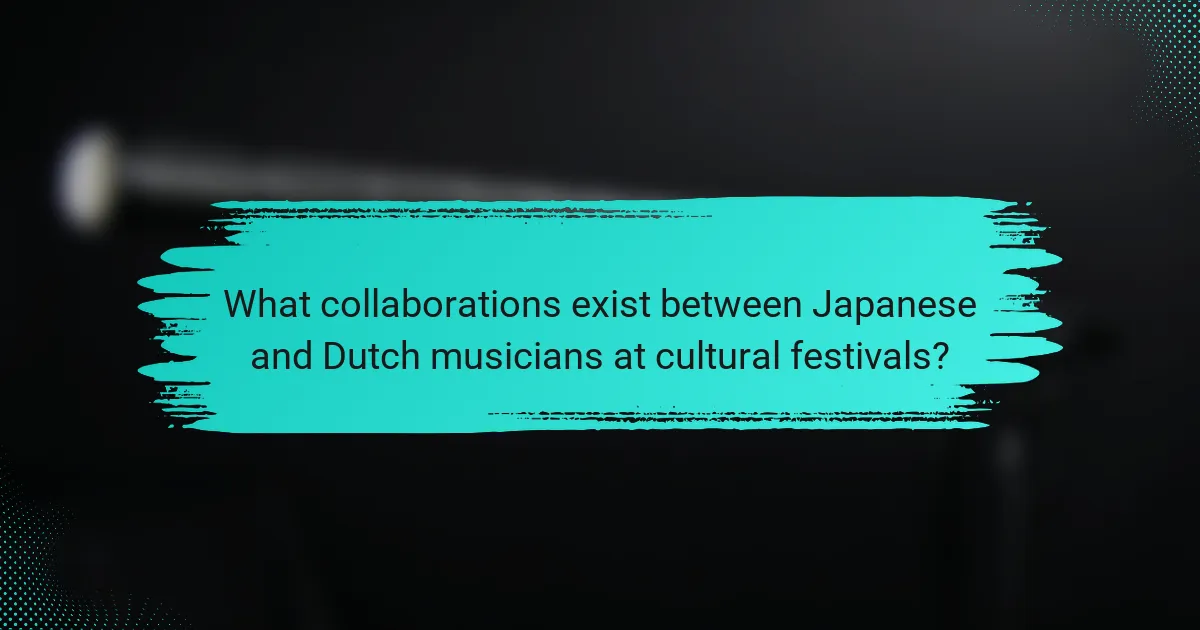
What collaborations exist between Japanese and Dutch musicians at cultural festivals?
Collaborations between Japanese and Dutch musicians at cultural festivals often showcase innovative music fusion and cross-cultural exchanges. Notable events include the Japan Festival in Amsterdam, featuring traditional Japanese instruments alongside Dutch electronic music. The Tokyo Festival highlights Dutch jazz ensembles, creating unique soundscapes. Additionally, the Holland Festival invites Japanese artists to collaborate with local musicians, enhancing cultural appreciation. These partnerships foster artistic dialogue and broaden audiences’ musical horizons, enriching both cultures.
How do these collaborations influence cultural exchange?
Collaborations significantly enhance cultural exchange by blending Japanese and Dutch music traditions. These festivals showcase innovative performances that foster mutual understanding and appreciation. They create platforms for artists to experiment with diverse styles, enriching both cultures. As a result, attendees experience a fusion of sounds that broadens their musical horizons and cultivates cross-cultural connections.
What are notable examples of successful collaborations?
Notable examples of successful collaborations in cultural festivals include the Japan Netherlands Music Festival and the Dutch-Japanese Cultural Exchange. These events showcase innovative music performances that blend traditional and contemporary styles, highlighting the unique attributes of both cultures. Collaborations often feature renowned artists from Japan and the Netherlands, creating a vibrant atmosphere that celebrates diversity in music. As a result, these festivals foster cross-cultural understanding and appreciation, enriching the artistic landscape for attendees.
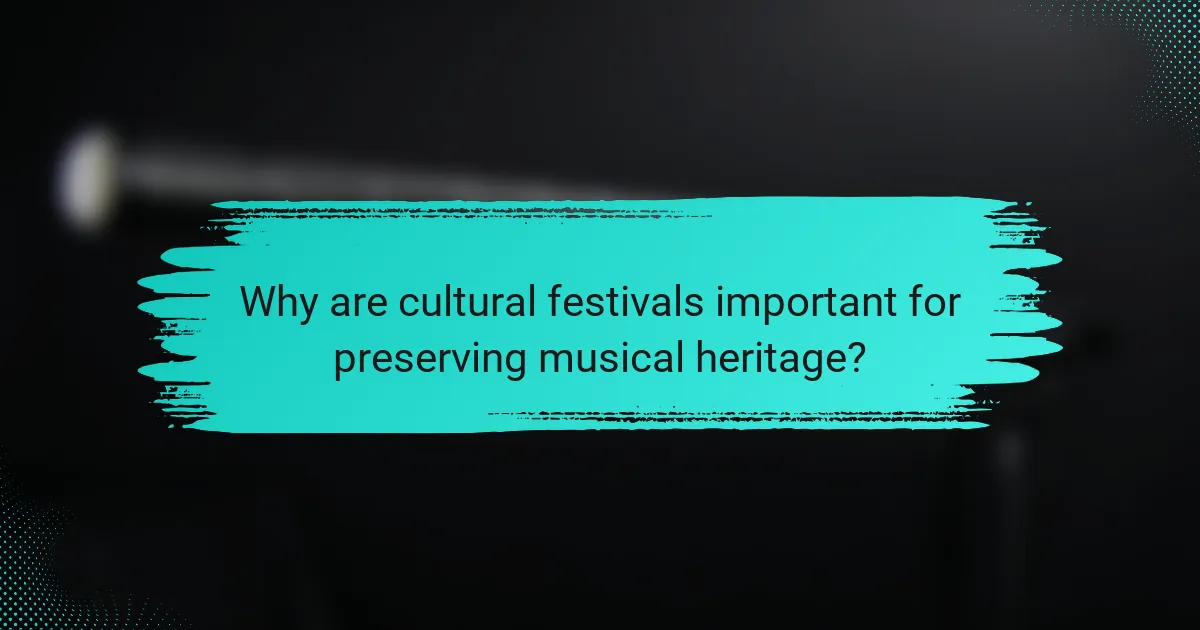
Why are cultural festivals important for preserving musical heritage?
Cultural festivals are vital for preserving musical heritage as they showcase traditional music and encourage community participation. These events enable artists from Japan and the Netherlands to collaborate, blending unique musical styles and fostering innovation. Festivals often feature workshops, performances, and discussions that educate attendees about the historical significance of the music. As a result, they create a vibrant space for cultural exchange, ensuring that diverse musical traditions continue to thrive across generations.
How do festivals contribute to the sustainability of music traditions?
Festivals play a crucial role in sustaining music traditions by fostering community engagement and cultural exchange. They provide a platform for artists to showcase traditional music, ensuring its transmission to future generations.
Cultural festivals, particularly in Japan and the Netherlands, highlight innovative collaborations that blend traditional and contemporary styles. This fusion attracts diverse audiences, enhancing appreciation for cultural heritage.
Moreover, festivals often incorporate educational components, such as workshops and performances, that teach attendees about the significance of various music forms. This educational aspect is vital for preserving unique attributes of each tradition.
As a result, festivals not only celebrate music but also contribute to its sustainability by creating a dynamic environment where traditions can evolve while remaining rooted in their cultural origins.
Which unique musical genres are highlighted in these festivals?
Unique musical genres highlighted in these festivals include J-Pop, traditional Japanese folk music, Dutch electronic dance music, and experimental sound art. These genres showcase cultural innovations and collaborations between Japanese and Dutch artists. Each genre reflects distinct cultural influences and contemporary trends, enriching the festival experience.
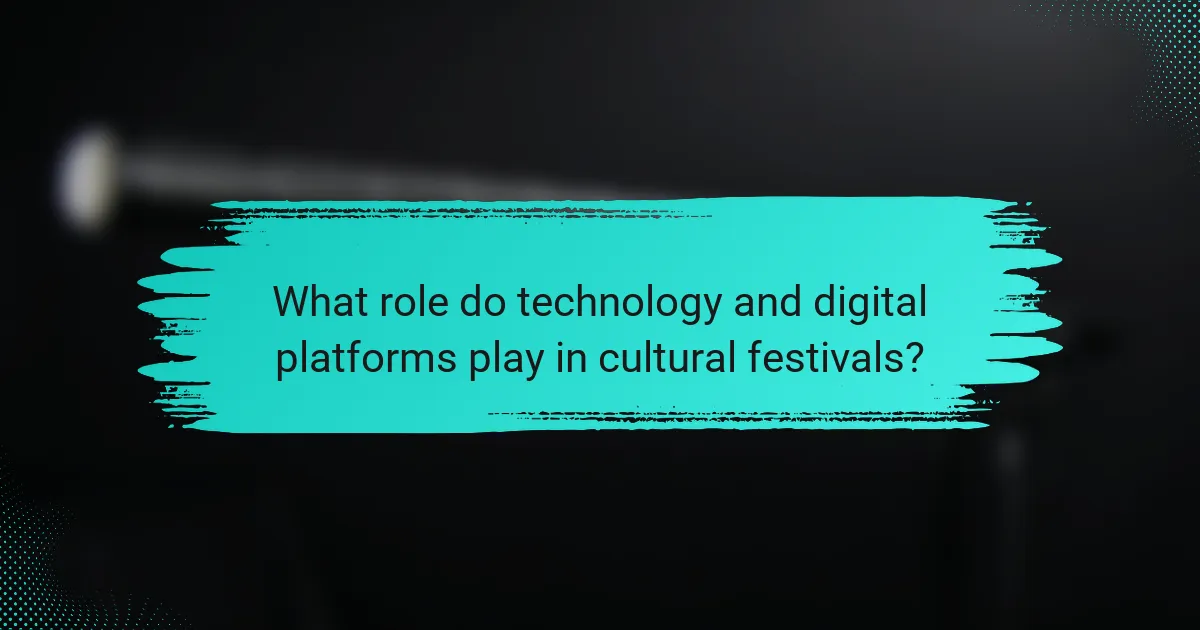
What role do technology and digital platforms play in cultural festivals?
Technology and digital platforms significantly enhance cultural festivals by facilitating global collaboration and audience engagement. They allow artists from Japan and the Netherlands to share music innovations, reach wider audiences, and promote cultural exchange. Digital platforms enable live streaming, which increases accessibility for remote participants. Additionally, social media amplifies festival visibility, fostering community connections and participation. Data analytics from these platforms help organizers tailor experiences to audience preferences, enhancing overall satisfaction.
How has technology transformed the experience of music festivals?
Technology has significantly enhanced the experience of music festivals by improving accessibility, engagement, and overall enjoyment. Innovations such as live streaming allow global audiences to participate in events remotely. Mobile apps provide real-time updates, enabling attendees to navigate schedules and discover artists easily.
Furthermore, advancements in sound and lighting technology create immersive environments that elevate performances. Virtual reality experiences offer unique interactions, allowing fans to feel present even from afar. Additionally, social media platforms foster community building and enhance festival promotion, drawing larger crowds and encouraging collaboration between Japanese and Dutch music scenes.
The integration of cashless payment systems streamlines transactions, enhancing convenience for festival-goers. As a result, technology has transformed music festivals into dynamic, inclusive events that celebrate cultural innovations and collaborations.
Which digital platforms are most effective for promoting festivals?
Social media platforms, particularly Instagram and Facebook, are most effective for promoting cultural festivals. These platforms allow for vibrant visual storytelling and community engagement. Instagram’s emphasis on images and videos helps showcase festival highlights, while Facebook facilitates event organization and audience interaction. Additionally, TikTok’s growing popularity can attract younger audiences through creative content. Email marketing also plays a significant role in reaching dedicated festival-goers with personalized updates. Overall, a multi-platform approach maximizes outreach and engagement.
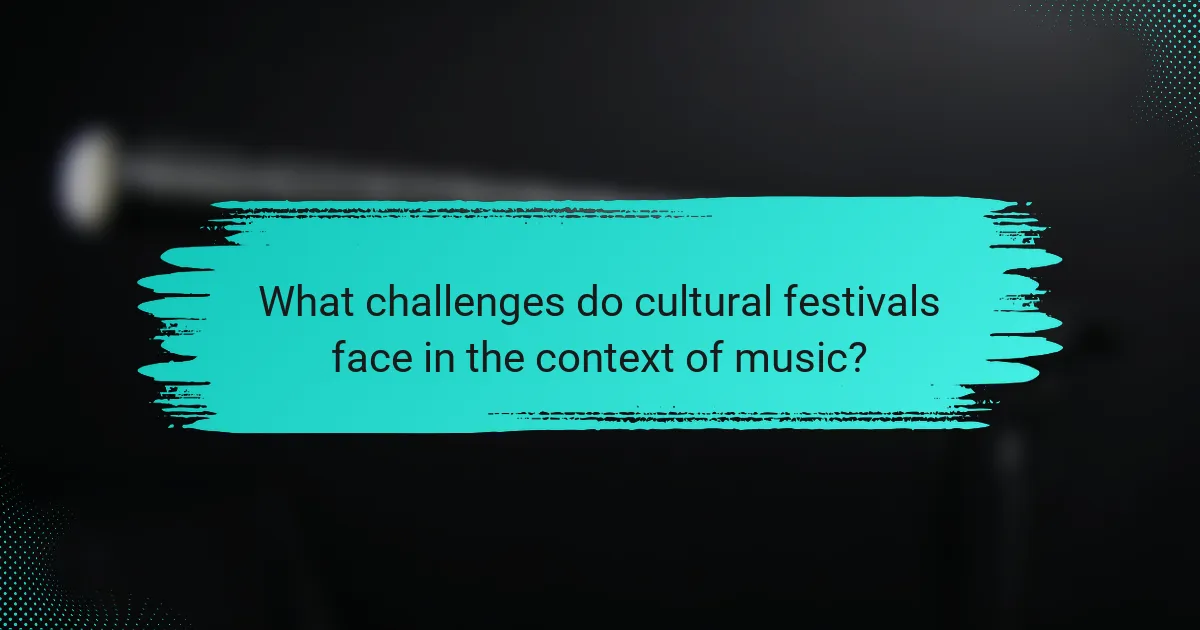
What challenges do cultural festivals face in the context of music?
Cultural festivals face challenges in promoting Japanese and Dutch music innovations due to funding limitations, cultural misunderstandings, and logistical issues. These factors can hinder collaboration and audience engagement. Festivals often struggle to attract diverse talent and audiences, impacting their sustainability. Additionally, balancing tradition with modern interpretations can create tension among stakeholders.
How do funding and sponsorship impact festival success?
Funding and sponsorship significantly enhance festival success by providing essential resources and visibility. Financial backing allows for high-quality performances and marketing initiatives, attracting larger audiences. For instance, partnerships with local businesses can lead to increased community engagement and support. Moreover, sponsorship deals often come with promotional benefits that elevate the festival’s profile, drawing attention to innovative collaborations in Japanese and Dutch music. Ultimately, strong financial support fosters a vibrant environment for cultural exchange and artistic expression.
What are common logistical issues faced by organizers?
Common logistical issues faced by organizers include coordination challenges, budget constraints, and venue limitations. Organizers often struggle to align schedules among various stakeholders, which can lead to overlaps and conflicts. Budget management is crucial, as unexpected expenses can arise, affecting overall planning. Additionally, securing appropriate venues can be difficult, particularly when considering capacity, accessibility, and technical requirements. These factors can significantly impact the success of cultural festivals celebrating Japanese and Dutch music innovations and collaborations.
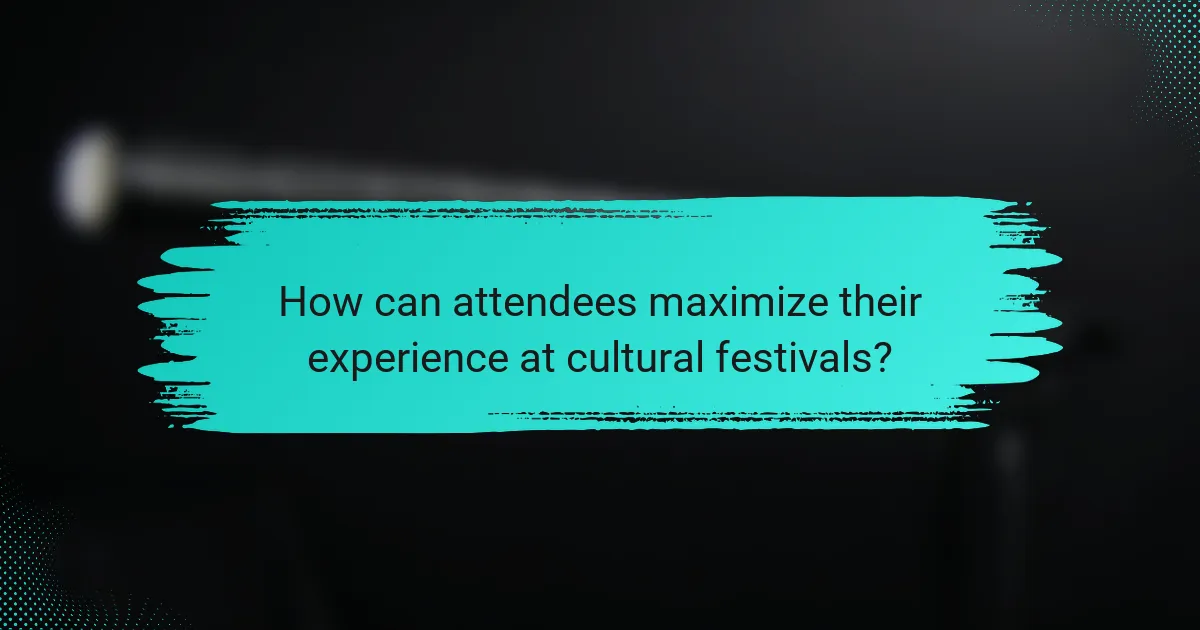
How can attendees maximize their experience at cultural festivals?
Attendees can maximize their experience at cultural festivals by engaging actively, exploring diverse performances, and participating in workshops. Embrace opportunities to connect with artists and fellow attendees, enhancing appreciation of Japanese and Dutch music innovations.
1. Plan your schedule to include key performances and workshops.
2. Arrive early to secure good spots and soak in the atmosphere.
3. Engage with artists during Q&A sessions or meet-and-greets.
4. Explore food and art vendors to experience cultural diversity.
5. Take notes or share experiences on social media to capture memories.
6. Attend discussions on music collaborations to deepen understanding.
What are the best practices for engaging with festival activities?
To engage effectively with festival activities, immerse yourself in the cultural experiences offered. Attend workshops, participate in discussions, and explore local food and art.
Consider these best practices:
1. Research the festival schedule in advance to prioritize events.
2. Network with performers and organizers to gain insights.
3. Engage with interactive installations to deepen understanding.
4. Share experiences on social media to connect with a broader audience.
These actions enhance appreciation of Japanese and Dutch music innovations while fostering collaboration.
Which tips can enhance the enjoyment of musical performances?
To enhance the enjoyment of musical performances at cultural festivals celebrating Japanese and Dutch music, consider these tips.
1. Engage with the artists through Q&A sessions or workshops.
2. Immerse yourself in the festival atmosphere by exploring food and art installations.
3. Attend diverse performances to appreciate various musical styles and innovations.
4. Connect with fellow attendees to share experiences and insights.
What common mistakes should festival-goers avoid?
Festival-goers should avoid overpacking, neglecting hydration, and ignoring local customs. Prioritize comfort and awareness to enhance the experience.
1. Overpacking: Bring only essentials to stay mobile.
2. Neglecting hydration: Drink water regularly to maintain energy.
3. Ignoring local customs: Respect cultural practices to foster goodwill.
4. Arriving late: Get there early for the best experience.
5. Skipping research: Know the lineup and schedule to plan effectively.
